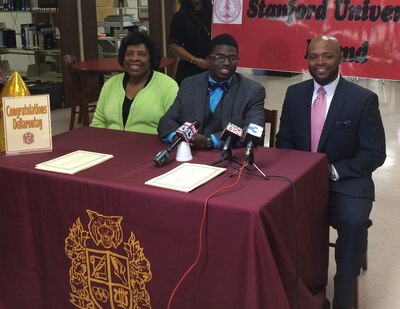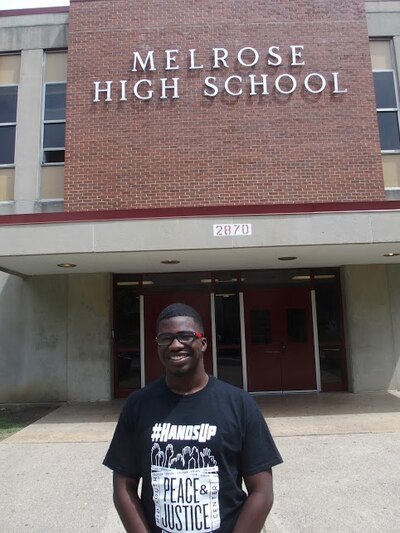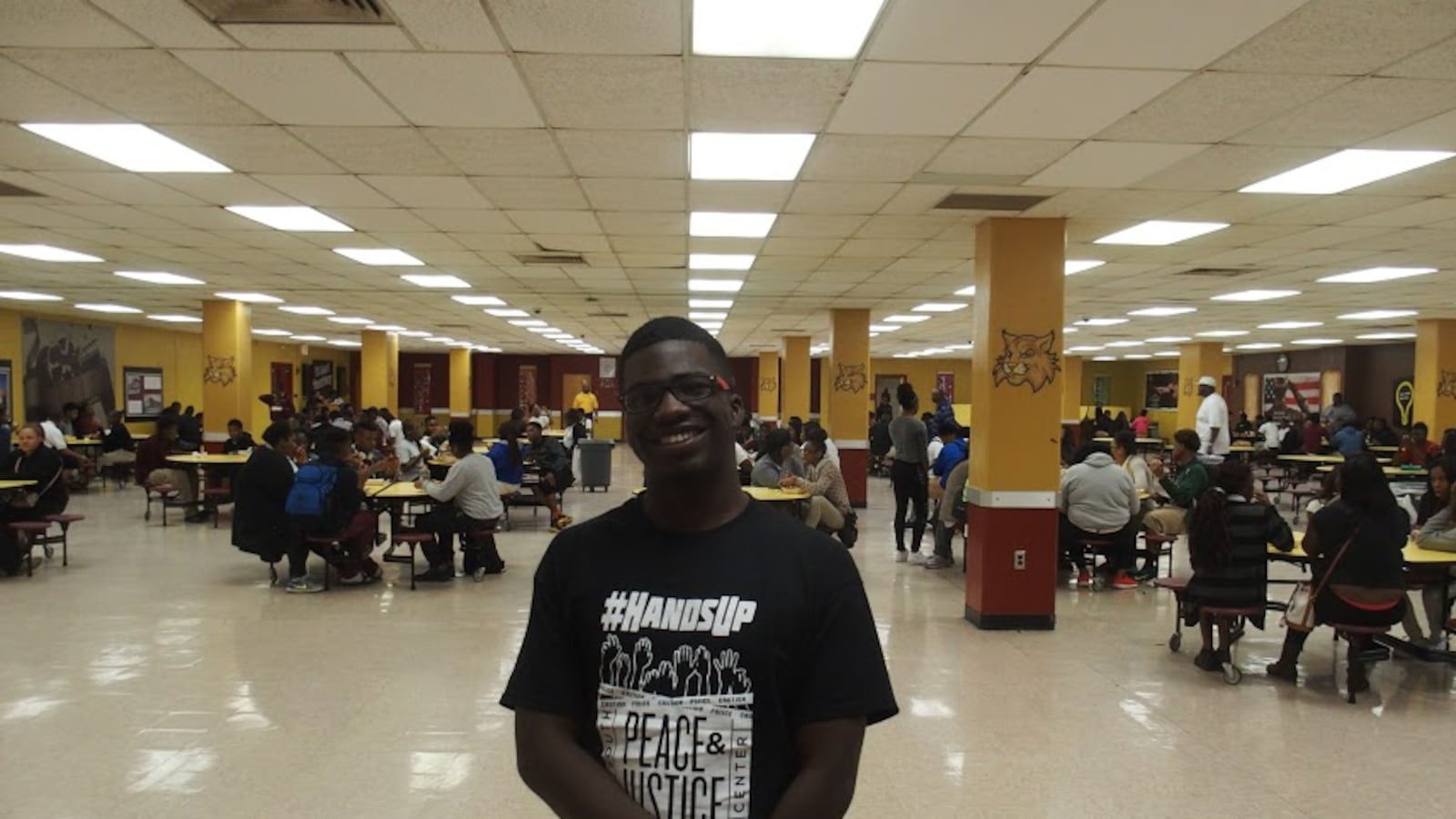Beset by poverty while pursuing their education in a low-performing school system, only 1 percent of students at Memphis Melrose High School are considered “college ready,” based on ACT scores.
Yet Dellarontay Readus, who graduates on Tuesday from Melrose, has defied the odds and is heading to Stanford University on a full scholarship.
How did he rise above the challenges that surrounded him, including attending 10 schools before the 10th grade — some of which are are among the bottom 5 percent of Tennessee public schools? How did he excel academically while also working 30 hours a week outside of school to help support his blind mother?
Dellarontay is no stranger to hard work. He taught himself about computer science through free online courses taken on computers at the public library, since he does not have Internet service at his family’s apartment. He plans to continue that work ethic in college and beyond, majoring in computer science and eventually starting his own company.
In an interview with Chalkbeat, Dellarontay, who also turns 18 this week, talks about how he went from being a grade behind his classmates to being his class valedictorian; his ideas for helping struggling students succeed; and his message to students facing challenges similar to his.
What was your most engaging assignment in a high school class?
It was actually a few weeks ago, where I was supposed to write a research argument about a topic dealing with my community. Specifically I chose to write about the iZone (Innovation Zone) school district and whether or not it truly enables success in schools. This was very important pertaining to me as I am in an iZone school and our school has been named a priority school, one of the bottom 5 percent schools. So I thought it was something that was crucial and also important to write about. As I was researching and developing my understanding of the concepts, I was introduced to a lot of different things I didn’t know existed. For instance, I didn’t really know what an iZone school was, even though I’d been going to school in one. I didn’t know there were so many rules and regulations. I just thought, hey, it’s a school, and a program was set in place to help students succeed. I didn’t know the background information —that there were actually so many court cases, court decisions about it and that there was so much power behind it.

I actually interviewed teachers, principals and students from other iZone schools and also students from my school. I did that to have a better understanding of their mindset and what they feel their school is doing versus the actual statistics that show whether or not their school is succeeding or failing.
Before I did the research paper, I would have said that the iZone was just another program designed to assist students. It may help a little, but it won’t do anything. But after I did the research and saw the different programs, I can truthfully say the iZone would increase the education level very very far above what it is right now.
If you were the principal of your high school, what changes would you make to help students make it to college?
My school has a great system of assistance to students because they try to help each and every one to go on and do better things, go on and get a degree, or get some kind of certification. What they’re doing now is focusing on 11th- and 12th-graders. If I was principal, I’d focus my time on the ninth- and tenth-graders, not just to pass the standardized tests that are mostly targeted toward them but prepare them for college and stuff like that. For example, I’d have them take the ACT more often. I’d have the 10th-graders take not just the PSAT but the ACT as well, so they can get more immersed in the test. I’d also advocate for them to take the SAT, because that’s something in the South that isn’t really done, but I feel like that, for the student to have the opportunity to take both, they might not do as well on one, but they may have the opportunity to do better on the other. Some people’s minds are geared a certain way and may be unable to work as well on a certain test. For instance, I didn’t do so well on my SAT. However, after I kept trying and kept taking the ACT, I was able to get a 31, which isn’t like the best score you can get, but it’s high up there and it enabled me to get to places like Stanford.
The challenges for public schools in Memphis are widely documented. Why do you think you were able to rise above those challenges?

I would say that one of my teachers, her name was Miss Meckaela Langhorn, now Mrs. Sellars, was inspirational to me in 10th and 11th grade, and is even now, even though she’s moved to Atlanta. She saw something in me that I didn’t see in myself at the time after having moved around a lot [causing] my spirit to actually diminish. She saw me, recognized my potential, and she put me in her honors Spanish class. She advocated for me on so many levels. It gave me the opportunity to be around people with great intelligence. Her belief in me, her strength, her attitude toward me, led me to do a lot of great things.
I would have to say that the mindset of trying to be different helped me a lot. I didn’t really care too much that I was different because — where everybody was at was not a place I wanted to be. There were so many people in my community and so many people going to school with me that were living not the way I wanted to live my life, that it didn’t even matter to me to be different. It was not a dare, it was not a challenge to be different; it was mandatory, because there was no way I was going to live the rest of my life knowing I couldn’t do this. I always wanted better for myself, I always wanted better for my family, so I tried to do everything I could to assist myself. I never did anything that would tear myself down.
You plan to major in computer science at Stanford, but your high school doesn’t have a computer science program. How did you become interested in computer science?
I’ve been building on and developing my skills with computer science for years, going to libraries. There are actually Stanford courses for computer science available for free online that I used to look at and things like that [which] I used to build up my skills and knowledge base.
You transferred schools a lot. What advice do you have for students who regularly switch schools?
I would have to say keep trying. At one point, I was in the 10th grade taking all ninth-grade classes because I moved in between states, and the courses had different names and different requirements. I was able to get to where I am today because I kept trying. I kept asking to see if I could be in more classes, better classes. If I didn’t, I’d probably have stayed a year behind everyone else because of all of the moving around I did. Instead of doing that, I tried to do better for myself and then to go onto AP classes, dual credit classes, things like that.
EDITOR’S NOTE: Each month, Chalkbeat conducts a Q&A interview with a different leader, innovator, influential thinker or hero across Tennessee’s education community. We invite our readers to email Chalkbeat your suggestions for future subjects to maldrich@chalkbeat.org.
Contact Grace Tatter at gtatter@chalkbeat.org.
Follow us on Twitter: @GraceTatter, @chalkbeattn.
Like us on Facebook.
Sign up for our newsletter for regular updates on Tennessee education news.


